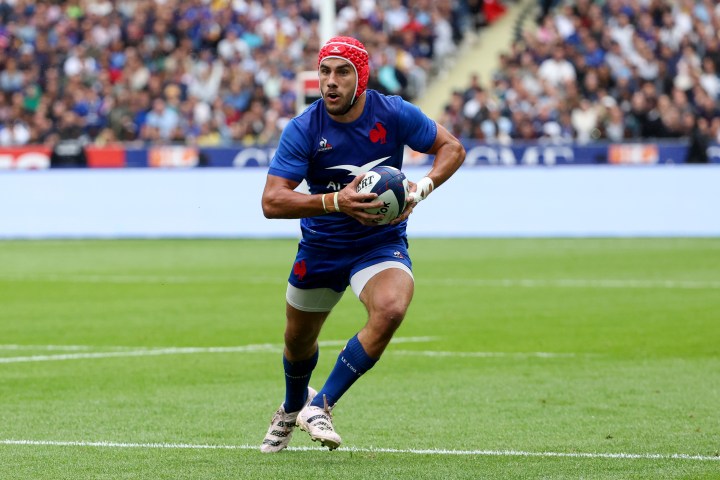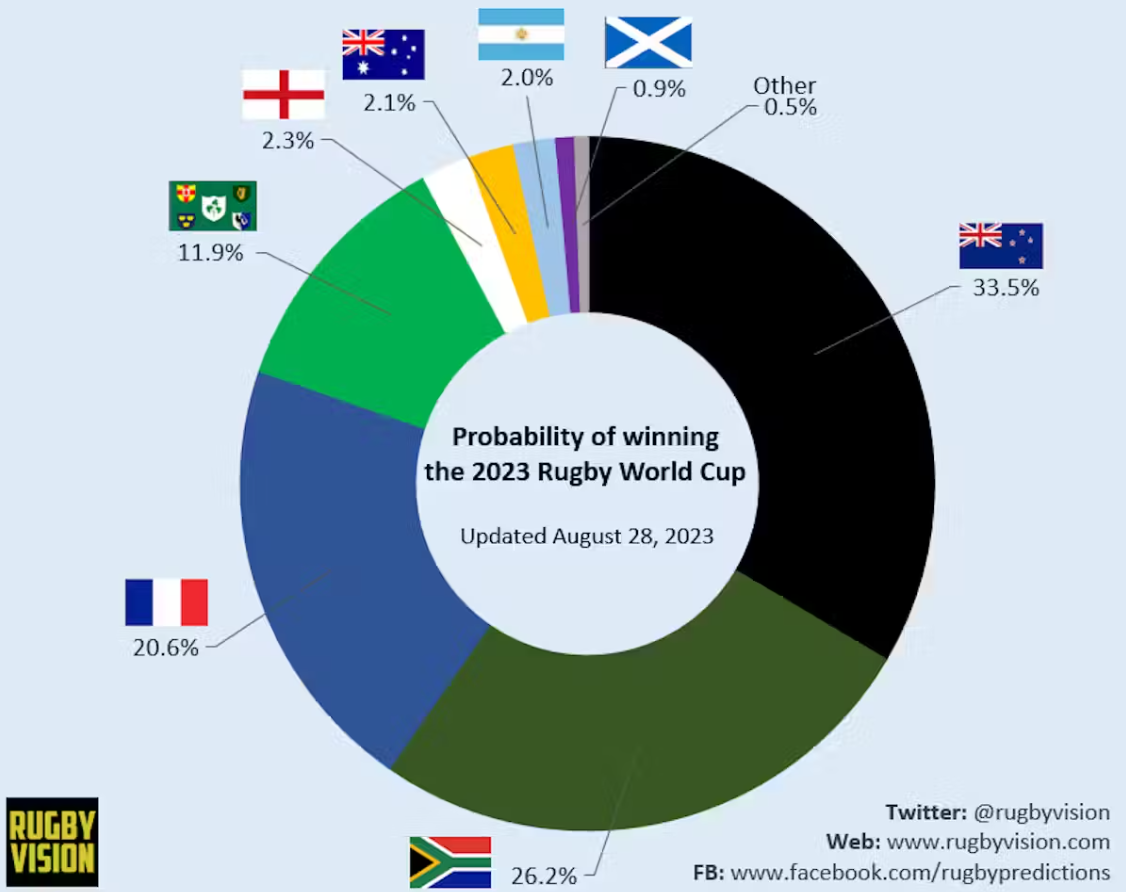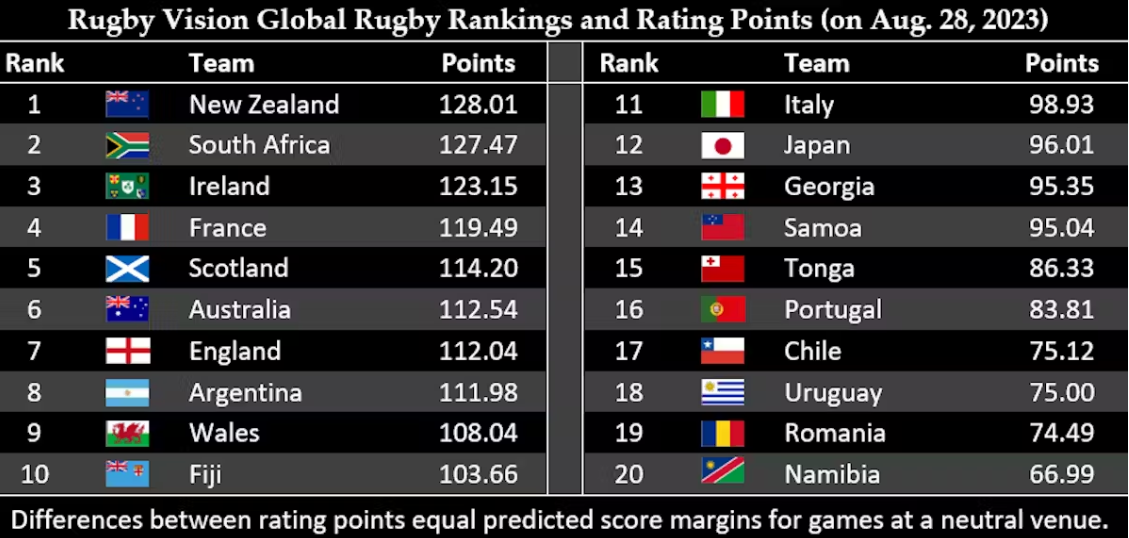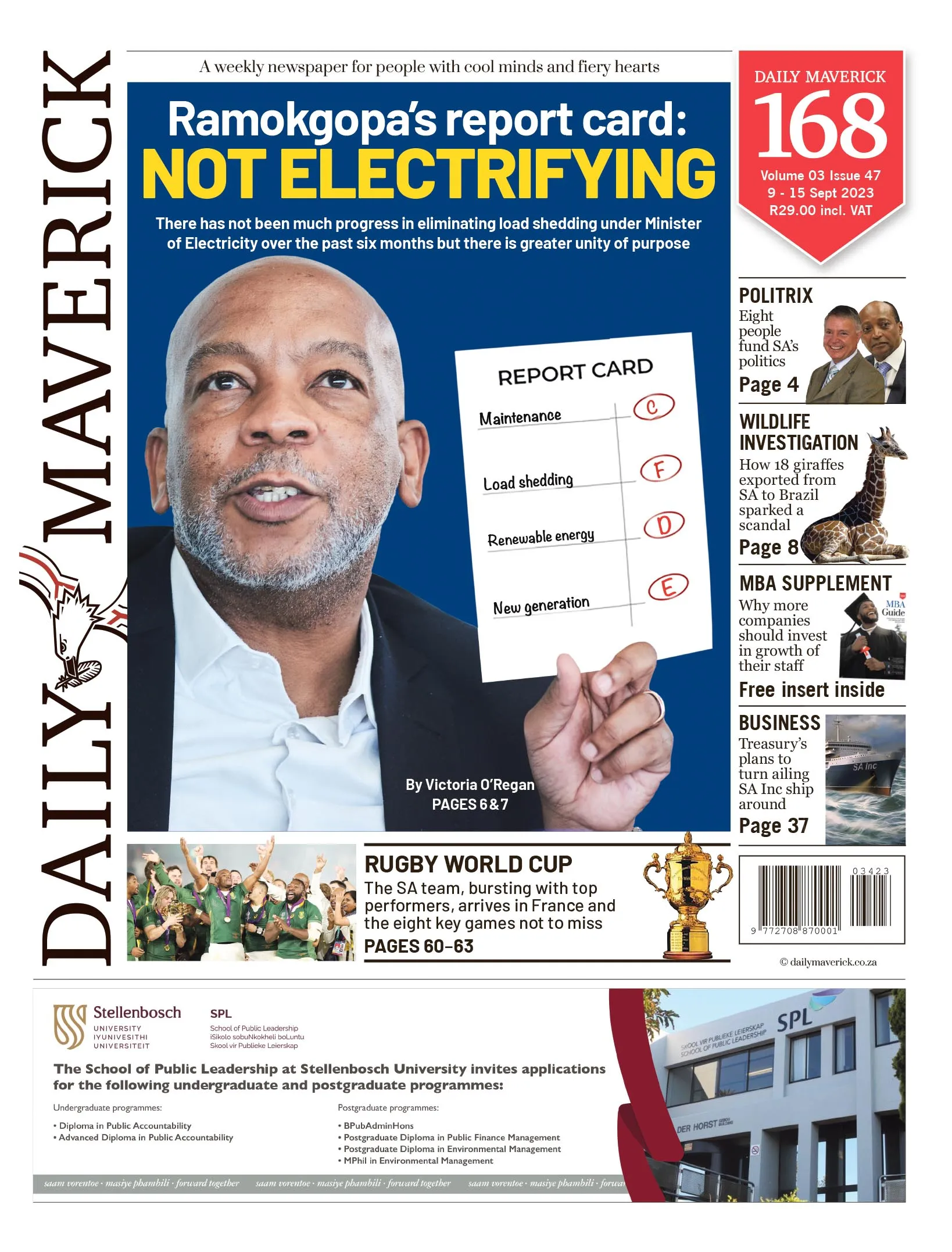RUGBY
Who will win the Rugby World Cup? A well-tested algorithm has it pegged

Statistical modelling using a well-calibrated algorithm predicts the All Blacks will hold aloft the coveted trophy, but it can’t account for unpredictable upsets, which may sway the outcome.
Despite New Zealand’s record loss to South Africa in August, All Blacks fans can take heart from statistical modelling that has them as favourites to win the 2023 Rugby World Cup.
According to Rugby Vision, a well-tested algorithm I developed to predict outcomes for major rugby competitions, New Zealand has a 33.5% chance of winning its fourth RWC title. The next most likely champions are South Africa (26.2%), followed by France (20.6%) and Ireland (11.9%).
An evaluation of the model’s predictions at previous RWCs indicates it is well calibrated. And though the system has some similarities with the official world rugby rankings, it is less sensitive to the outcome of any particular game.
The Rugby Vision model uses three key components: a rating system for international teams; estimation of expected outcomes for each RWC game using those ratings; and 10,000 simulations of the tournament to account for uncertainty about expected outcomes.
Global rugby rankings

Rugby Vision outlines the probability of each country’s winning the Rugby World Cup 2023. (Image: Supplied)
The Rugby Vision rankings are a custom “points exchange” system based on past game results and home advantage (if applicable). After each game, the team that performed better than expected will gain rating points, and the team that performed worse than expected will lose rating points.
These rankings and ratings points for the 20 teams that have qualified for the 2023 RWC are displayed on the right. New Zealand is the top-ranked team, followed by South Africa, Ireland and France.
The same four teams make up the top four in the official rankings, but the seedings are different. The official world rankings have Ireland at the top, followed in order by South Africa, France and New Zealand.
Predicting game results

The algorithm’s rankings and ratings points. (Image: Supplied)
This means that in the opening game of this year’s RWC – between France and New Zealand in Paris – New Zealand were expected to win by three points. This is based on the difference in the teams’ rating points (128 minus 119.5) plus 5.5 for the France home advantage.
This estimate means that, if the game were played 100 times, New Zealand would win by three points on average. According to the model, in those hypothetical 100 matches, New Zealand would win 57 games, France 40 and three games would be drawn.
Visit our Rugby World Cup hub: See pools, match schedule, kick-off times and news
RWC simulations
World Cup teams are initially separated into four pools, with the top two teams in each pool qualifying for the quarterfinals.
In pool games, four competition points are awarded for a win, two points for a draw, and two types of bonus points are offered (one point can be earned for losing by seven or fewer points, and one point is awarded for scoring four or more tries).
Accordingly, the Rugby Vision framework includes a model that estimates the expected number of tries scored by each team in each game.
To account for uncertainty in game outcomes, the system simulates the RWC 10,000 times in accordance with tournament rules. For each of these simulated tournaments, the framework estimates game results and bonus points for each pool game, pool finishing positions, knockout matches and the winner of each knockout game.
Estimated probabilities of each team reaching various stages of the 2023 RWC are shown below. These are influenced by team rating points (including home advantage for France) and the draw (which pool each team is in, and rules for allocating teams to knockout games).
Pool predictions and beyond
In Pool A, heavyweights New Zealand (98.9%) and France (97.9%) are highly likely to qualify for the quarterfinals. South Africa and Ireland are the likely quarterfinalists from Pool B, but there is a 26.3% chance that Scotland will send one of those teams home early.
Pool C appears to be the most even group. Australia (87.2%) and Wales (68.3.2%) are the most likely teams to progress, but Fiji (37.3%) also has a reasonable chance of qualifying for the quarterfinals.
In Pool D, England and Argentina are favourites to make the quarterfinals, with Japan and Samoa possible spoilers.
After the initial round, Pool A teams will play opponents from Pool B in the quarterfinals. Because these are strong pools, semifinalist probabilities for these teams are relatively low.
For example, Ireland has an 81.2% chance of being a quarterfinalist, but only a 33.1% probability of making the semifinals.
Teams in Pools B and C will have easier quarterfinal opponents. Consequently, despite relatively low rankings, England is the second most likely team to make the semifinals.
Towards the final whistle
In the semifinals, teams from Pool A and/or B will play teams from Pool C and/or D. As teams from Pools A and B are heavily favoured to win those games, their finalist probabilities are only slightly lower than their semifinalist probabilities.
Conversely, Pool C and D teams with high semifinalist chances have relatively low finalist probabilities. For example, England has a 55.0% chance of playing in a semifinal but only a 9.7% chance of being a finalist.
The RWC draw makes it easier for Pool C and D teams to qualify for the semifinals, but these teams are all but guaranteed to play strong semifinal opponents. In short, the draw helps Pool C and D teams go deeper into the tournament, but it does not increase their chances of winning.
Though the Rugby Vision predictions provide a reliable forecast, upsets do happen – we just don’t know when. That’s what makes sport so interesting, after all. DM
First published by The Conversation.
Niven Winchester is a professor of economics at Auckland University of Technology.
This article appeared in our weekly Daily Maverick newspaper, DM168, which is available countrywide for R29.





















 Become an Insider
Become an Insider
Statistical modelling by a Kiwi professor and New Zealand win… no surprise there!
“Statistical modelling using a well-calibrated algorithm predicts the All Blacks will hold aloft the coveted trophy, but it can’t account for unpredictable upsets, which may sway the outcome.”
Oh what a yawn. He is a professor of economics at Auckland University of Technology. He isn’t a professor of stats!
Never forget “Lies, damn lies, and statistics” (as if you would) and maybe (amongst many) “An economist is an expert who will know tomorrow why the things he predicted yesterday didn’t happen today.”
Good point.
I wonder if this oke included in his Bok stats:
1. That they only started playing in the RWC in 1995, 8 years after the others, so have had only 71.42857% fo the time the ABs have had;
2. The ABs should never have won the cup in 2011 due to their ref Bryce Lawrence whistling the Boks’ quarter final against the grovelling (in the loose scrums Pocock);
3. The black swan downpours at Twickenham in the semifinal in 2015 that their silly haka brought down on purpose and helped them win and go onto win the final.
So, statistically, politically and weatherly, he’s talking through his backside. I still think the French might beat the Boks in the final, but certainly the ABs won’t as much as he might think (or in economist talk, pray).
Superb response.
I’m afraid that economists have an incredibly limited vision of the world, and it shows not only in this analysis, but, even worse, in business and in government. Economists make some seriously flawed assumptions in their attempt to make sense of the world. They assume perfect conditions made with perfect information made by perfectly predictable human beings. That is a dangerous fallacy. At school and university we get questions with only one correct answer: “ Bus A leaves Pretoria heading due south at 68 km/hour, and Bus B leaves Johannesburg heading due north at 80 km/hour. If the two cities are 62 km apart, where and at what time will they meet?” The reality is that NOTHING in real life even vaguely resembles this. Breakdowns occur and there is a traffic jam, and then the bus driver has to stop to let someone vomit on the side of the road. Economists don’t even think about including any extra variables because it complicates their formulas.
Apart from the fact that there are a thousand variables that could affect the outcome of every single match, (from the weather to the crowd to the refereeing decisions to the choices the coach makes…, and more,) predictability takes the fun out of it all – just as Formula 1 became incredibly boring when Schumacher kept winning every race.
God does not run the world with spreadsheets, and neither should we. GO BOKKE!